Morningstar Read online
Page 4
The war ended in 1975, the year after I graduated from high school. I had no childhood without the Vietnam War in it. The draft loomed over everyone’s head. At first, there were college deferments. Even so, around the kitchen table my aunts and uncles talked about writing to congressmen or someone—anyone—important. Our family did not know anyone important. But my father had a certain amount of cachet in our relatives’ eyes. He had worked for Admiral Rickover at the Pentagon, though only as his driver and assistant. When he retired from the navy after twenty years, he took a job at a company called RMK that shipped goods to Vietnam. The job had required a high security clearance. His boss, Mr. Carothers, adored him. Surely he knew somebody who could keep my cousins Stephen, Michael, David, Alfred, and Chip out of the army, out of Vietnam, home and safe.
Stephen enlisted before he could get drafted and spent his time in the army in Walla Walla, Washington. Michael and Alfred got college deferments. But David got drafted and was shipped to Vietnam almost immediately, leaving his fiancée Claudette behind to plan their wedding alone. In my house, Mama Rose lit candles at the feet of statues of saints in the small shrines she kept around—the Virgin Mary, Saint Anthony, Saint Christopher. Novenas were made. I watched the war on TV, emotionless, not once thinking of Cousin David or any of the boys fighting on the screen right in front of me. This was my generation: immune to the horrors of war because it had been playing out in our living room our entire lives. One day our dog barked and growled like crazy outside and we all ran to see what was the matter. Cousin David was making his way up the sidewalk, home again.
Had one year passed? Or two? I have no idea. But the wedding was waiting for him. The bridesmaids had their shoes dyed to match their gowns. The groomsmen rented tuxedos with shirts the same color. At the bridal shower David and Claudette received electric knives and electric can openers and electric toothbrushes. As a girl, I loved weddings, and although I don’t remember where this one was to be held, to me then weddings meant those fancy whiskey-sour fountains and string beans amandine and the hard, pale candies the women wrapped in tulle and tied with a ribbon. But just like that, the wedding was called off. David couldn’t go through with it. And it seemed to have something to do with what happened in Vietnam. At night great debates roared around the kitchen table. Did they have to return the wedding presents? Did she have to return the engagement ring? Were they breaking up? Or just postponing the wedding?
That was the first indication I had that this war was not a two-dimensional image on my television screen. That gunfire was real. Those bodies falling were people. People dying. A person could go to war in love and return unable to go through with the wedding. Of course, I knew this was true of World War II. All of our fathers, except mine, who was just young enough to miss it, had been in the War. There were lingering bad feelings toward Japan and Germany. We celebrated V-J Day every August—Victory over Japan. We knew who Hitler was (though not the atrocities, not yet), and we knew what had happened on Omaha Beach and Iwo Jima. My cousin’s neighbor Frenchie had one arm, the other lost at Iwo Jima. In the eponymous movie about the battle there was a character named Frenchie: him. He was one of the men in the famous statue of soldiers raising the flag. To me—maybe to all of us my age—that was the War. This thing on television was more like the show Combat! on Monday nights, Vic Morrow crawling toward the camera in his camouflage, clutching his gun.
The other war—World War I—seemed to have happened a million years earlier. It wasn’t until high school that I even learned what had started it, Gavrilo Princip jumping out in front of Archduke Ferdinand in Sarajevo and shooting him and his wife. My father used to tell me about a teacher he had in grade school back in Indiana who was “shell-shocked from the war.” If a child tapped his pencil or foot, the teacher would start to shake and run to the closet to hide. I never bothered to ask which war he’d fought in; it wasn’t until many years later that I understood it was World War I. In front of the high school in our town stood a statue of a World War I soldier called Jerry, but to me the statue seemed to be there not to commemorate a war but rather to get spray-painted red and white by the Coventry Oakers, our football rivals on Thanksgiving weekend every year. When I watched All Quiet on the Western Front on Saturday Night at the Movies with Skip and Mama Rose (our parents out playing cards with my aunts and uncles as they did every Saturday night), I didn’t even realize the movie was about World War I. World War II was the war that still haunted us, that in many ways seemed more real than the one we were actually fighting at the time.
ALTHOUGH I CAN’T say for certain, I must have gotten a copy of Dalton Trumbo’s Johnny Got His Gun from one of my brother’s friends. They often gave me books to read, most of which I didn’t really understand. The Tin Drum. Siddhartha. The Painted Bird. The Teachings of Don Juan. But unlike those books, Johnny Got His Gun had a profound and lasting impact on me. Originally published in 1939, it is the story of Joe Bonham, an ordinary young man, in love with his sweetheart back home, who loses his arms, legs, face, ears—after a bomb dropped on him during World War I.
The book I read was a small paperback, and had a black cover with a large white hand forming a peace sign on it. Inside the palm of the hand stands the silhouette of a soldier in the iconic doughboy helmet of World War I, pointing a rifle. It was the edition I read a few years after it was released, dog-eared and wrinkled from so many readings by so many young men facing the draft. “This was no war for you. This thing wasn’t any of your business. What do you care about making the world safe for democracy? All you wanted to do Joe was live.” The little I knew about the Vietnam War sounded eerily similar. The United States was over there fighting for democracy, weren’t they? North Vietnam was Communist. Communism was spreading. If they took over South Vietnam, no one was safe from it, were we? “Oh why the hell did you ever get into this mess anyway? Because it wasn’t your fight Joe. You never really knew what the fight was all about.”
Wait, I thought as I read, this was what my brother and his friends were saying in our backyard, on the beach, and sitting around our kitchen table. This wasn’t our fight. This wasn’t any of our business.
Sometimes I tried to imagine Skip or one of his friends in a uniform, holding a gun, standing in a jungle. I tried to imagine their faces on the soldiers who fought on my television screen every night on the news. But it was too frightening—in the war I watched on TV, the soldiers got shot. They died. I saw coffins draped in American flags, dead boys inside, waiting to come home. It sounds foolish to say this now, but it wasn’t until that summer that I realized the war I saw on television was real. Now when Walter Cronkite announced the day’s death toll, I listened.
They knew what was important. . . . They died with only one thought in their minds and that was I want to live I want to live I want to live.
SKIP AND HIS friends had college deferments. But still the draft loomed over them. They drank beers and ate Mama Rose’s meatballs and sausage and pepper sandwiches and talked about going to Canada or Sweden for amnesty. Although there was something thrilling about that idea—sneaking over a border at night on foot; living among fjords and the Northern Lights—I knew that if you did that you were never allowed home to the United States again. Surely Skip wouldn’t opt for that, would he?
They discussed the viability of filing as a conscientious objector. A well-told story in our household was that my mother had dated a conscientious objector during World War II. He was a Quaker and Quakers were against war. (Of course, I had no idea what a Quaker was, except that one peered out at me from our container of oatmeal and that William Penn, founder of Pennsylvania, had been one too.) Was it too late for Skip to convert and become a Quaker? I wondered. After all, our father had converted to Catholicism in order to marry our mother and he always said it was really nothing. “You believe what you believe anyway,” he’d say.
All of these conversations made me unsettled in a way I couldn’t explain. Suddenly, the war itself made me unsettle
d. I grew up in a mostly traditional family, surrounded by dozens of relatives who were Democrats, went to town hall meetings, and voted in every election. Two of my uncles had fought in WWII. The other had a bad heart and the army wouldn’t take him, but he tried to enlist because you fought for your country. In other words, I was raised a proud American. My father was even born on the Fourth of July. He loved that his birthday was the same day as Independence Day. He’d blast John Philip Sousa music from the minute he woke up, and often at night the men who had come to his party, all of them WWII veterans, picked up broomsticks and mops and marched around the yard with tears in their eyes.
But after I read Johnny Got His Gun, I started to question the things I’d been raised to believe. What were we fighting for in Vietnam anyway? Did Americans have the right to tell other countries how to live? What did it even mean to be an American? I started watching the news more carefully, and reading the newspaper reports about the war that I’d been ignoring. I sat in the backyard with Skip and his friends and listened to what they thought, what they believed. They discussed how Johnson had escalated the war, how we’d killed four hundred civilians at My Lai, how we’d secretly bombed Laos and Cambodia. No one could be trusted, not our president or any of the authority figures in charge.
Johnny thinks of himself as lying like a side of beef for the rest of his life. And for what? “It was a kind of duty you owed yourself that when anybody said come on son do this or do that you should stand up and say look mister why should I do this for whom am I doing it and what am I going to get out of it in the end?”
Around me, most of my cousins stayed on the path our parents had set us on. My father used to joke that we just followed our town’s main street: baptized at Sacred Heart, wedding at the Club 400, funeral at Prata’s Funeral Home. As a child, I had found comfort in our church with its smell of wax and incense, the sounds of shoes walking on marble, the brilliance of its stained-glass windows. I’d loved those weddings at the Club 400 too, the specialness of that whiskey-sour fountain bubbling forth cocktails the adults caught in special half-moon-shaped glasses.
But asking “Why should I do this?” wasn’t just about the war. It was about everything I thought I believed and knew. I’d always had this yearning for something I couldn’t name, that no one could help me name. Maybe that yearning was a big question: why?
SOMETHING NEW STARTED taking up airtime on the news. Or maybe it had been happening before I began questioning, became aware. But it seemed to me that suddenly college students were protesting the war. They appeared in front of college buildings and on college greens, dozens and dozens of them, long hair and earnest faces, carrying signs: MAKE LOVE NOT WAR and HELL NO WE WON’T GO. They were angry and passionate as they stood shoulder to shoulder, shouting and singing protest songs by Bob Dylan and Peter, Paul, and Mary like “Blowin’ in the Wind” and “Where Have All the Flowers Gone?” I wanted to be one of them, to be a person who cared that much about something, a person who made a difference.
Once again, my world had been cracked open by a book. But this time, the world that was shifting around me—my own small one and the one outside it—and the book itself crashed together in such a way that I felt like I was suddenly awake. Around me, my classmates still seemed unaffected by the war, the demonstrations, all of it. Vietnam had become the backdrop of our childhoods and it was easy to keep it that way, in the background. But I’d had a summer of college boys sitting in my backyard discussing the war. I’d heard them debate my father at our kitchen table and for the first time in my young life I disagreed with him. I’d read Johnny Got His Gun, perhaps the greatest antiwar book ever written, a book of which Trumbo himself wrote: “Johnny held a different meaning for three different wars. Its present meaning is what each reader conceives it to be, and each reader is gloriously different from every other reader, and each is also changing. I’ve let it remain as it was to see what it is.”
AT SCHOOL I was labeled a hippie. Even one of my favorite teachers took to calling me Hippie Ann. I wasn’t offended; I was proud. To me, being a hippie meant that you cared about the world, that you wanted to help stop the war in Vietnam. With my gypsy skirts and John Lennon round wire-frame glasses, I dressed the part too. Except I wasn’t acting; I was a girl too young to really do anything except try to be heard. In 1970, when the Ohio National Guard shot and killed four students at Kent State, I wore a black armband to school for a week. When I watched students on TV protesting the war, I used to think, Wait for me. Wait for me to grow up enough to join you.
Of course, the world didn’t wait for me to grow up. By the time I went to college, the Vietnam War was finally ending and protests were a thing of the past. The hippies who were still on campus were burnouts who had smoked too much pot or dropped too much acid to do anything meaningful. Those socially minded students had been replaced by boys in white leisure suits and girls practicing the Hustle in their dorm rooms and playing the soundtrack from Saturday Night Fever. There were discos instead of sit-ins, high heels instead of sandals. In other words, nothing was how I’d hoped it would be when I arrived at college.
But the events I’d watched take place around me as an adolescent left me someone who leans further left than even my Democratic parents; who still protests and resists war. Although the war of my youth was fought in Vietnam, Johnny Got His Gun took place half a century earlier. Reading it didn’t just make me take notice of what was happening around me; it showed me the horrors of all wars, of all the dead boys and misguided politicians. It made me ask why then, and it makes me still ask why now.
Lesson 4: How to Buy Books
• Love Story BY ERICH SEGAL •
EVERY WEEK MY MOTHER TOOK ME ALONG WITH HER to the local discount store, Ann & Hope, where she bought curtains, bath mats, and tablecloths on the cheap. Much to her disapproval, I brought my allowance so that I could buy a Nancy Drew book. The entire series was lined up, yellow spines out, the numbers and titles in order, beginning with The Secret of the Old Clock and ending with The Spider Sapphire Mystery. I had no sisters, just a mathematically obsessed brother who solved problems on a slide ruler for fun. But my cousin Gloria-Jean, a year older than me, shared my passion for reading and she also used her allowance to buy a Nancy Drew book every week. Our plan was to read every one of them, trading our newest ones after we’d finished.
At the cash register, my mother shook her head and sighed. “I cannot believe you are wasting your money on a book. A book! Of all things!”
I didn’t care. I held that yellow book close to my chest, and happily handed over my two dollars, the bills damp and creased.
Along the river of my small town, mills that had produced textiles in the nineteenth century now stood empty, leaving most of the town unemployed. A Champlin Grant to build a library led to breaking ground behind Main Street, where the movie theater showed XXX movies; Newberry’s, the five-and-dime, was boarded up; and sleazy bars replaced what had once been fine clothing stores. To avid readers like Gloria-Jean and me, the progress on the library seemed practically glacial. By the time it finally opened, we had read every Nancy Drew book and were ready to move on.
Move on we did. Agatha Christie and Charles Dickens; Harold Robbins and Herman Wouk; Victor Hugo and Evan Hunter. We read indiscriminately. We read everything. Three, four, five books a week we read. “A waste of time!” my mother would say when I hung up with Gloria-Jean after chatting about our latest reads. “Put the book down and go outside and play!” In family pictures during this time, I am always holding a book in my lap, my finger holding my place.
Then, in 1970, something almost more miraculous than a library came to town. The Warwick Mall opened, just a mile from my house, an easy walk on a Saturday morning. Boston department stores Jordan Marsh and Filene’s anchored each end of the mall. And on the path from one to the other stood the first bookstore I had ever seen. Waldenbooks was a small rectangle tucked between a fast-food steak house and a Spencer’s Gifts. Although the
lure of a $3.99 steak and a lava lamp were great, nothing called to me more than that bookstore.
At the front, a wooden display showed hardcover bestsellers, face-out. Beside it, a spinning rack held paperbacks, more than I ever imagined existed. Sometimes, I went there and touched every single book, the smell of incense and French fries from the neighboring stores filling my nose, all of it intoxicating.
On one of those visits, the novel Love Story caught my eye. The book was slender, white, with the title in big red, blue, and green letters. I still remember how Erich Segal’s name sat beneath it in red, and how the words “Love means never having to say you’re sorry” seemed more profound than anything I had ever read. That spring and into fall, Love Story remained on the bestseller list, securing its spot on the front display of Waldenbooks. Although I cannot remember how much the book sold for in 1970, I do remember that the price seemed—no, was—astronomical to an eighth grader in West Warwick, Rhode Island. If my mother thought spending $1.99 on a Nancy Drew book was a waste of money, what would she say if I brought home this beautiful, expensive hardcover book? I was not a kid who got in trouble, but I could imagine my mother’s wrath at such a purchase.
One day, as I stood fondling the book and pondering how love meant never having to say you’re sorry, it occurred to me that giving a book to Gloria-Jean would be the most wonderful present anyone had ever given her. Even though we already owned those Nancy Drew books, this book, Love Story, was a real book. A hardcover! A bestseller! Imagine owning such a thing! I remember that the cold weather had arrived, and I was wearing my pale blue winter jacket. Yet I shivered at the thought of it.

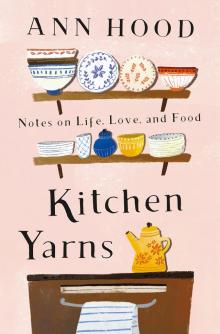 Kitchen Yarns
Kitchen Yarns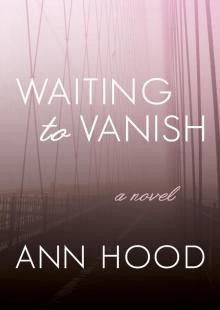 Waiting to Vanish
Waiting to Vanish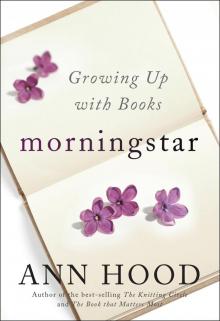 Morningstar
Morningstar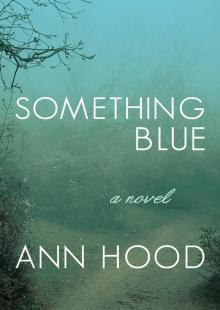 Something Blue
Something Blue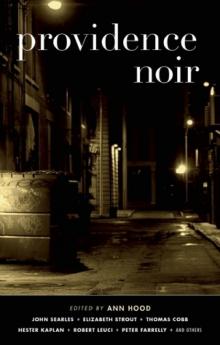 Providence Noir
Providence Noir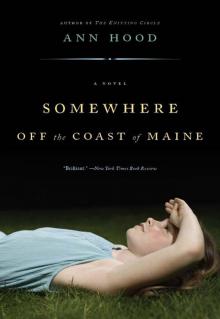 Somewhere Off the Coast of Maine
Somewhere Off the Coast of Maine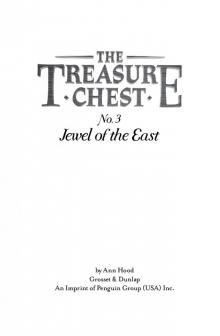 Jewel of the East
Jewel of the East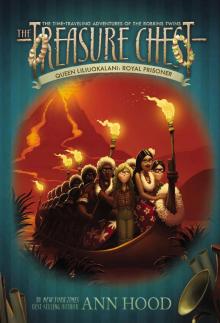 Queen Liliuokalani: Royal Prisoner
Queen Liliuokalani: Royal Prisoner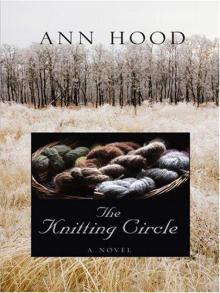 The Knitting Circle
The Knitting Circle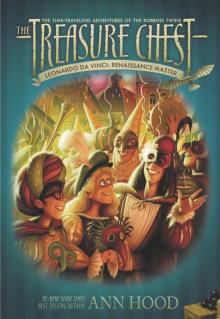 Leonardo da Vinci: Renaissance Master
Leonardo da Vinci: Renaissance Master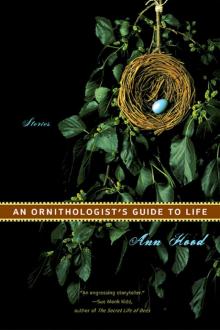 An Ornithologist's Guide to Life
An Ornithologist's Guide to Life The Red Thread
The Red Thread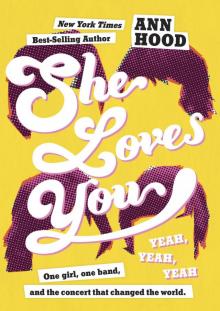 She Loves You (Yeah, Yeah, Yeah)
She Loves You (Yeah, Yeah, Yeah)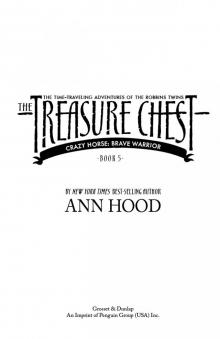 Brave Warrior
Brave Warrior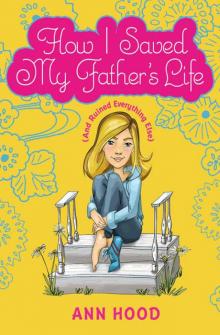 How I Saved My Father's Life (and Ruined Everything Else)
How I Saved My Father's Life (and Ruined Everything Else)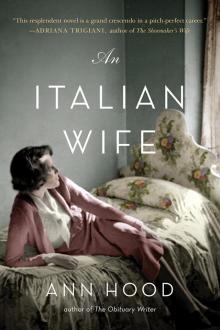 An Italian Wife
An Italian Wife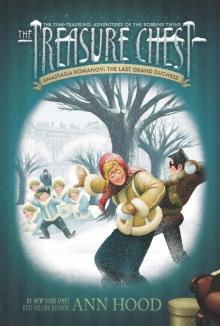 Anastasia Romanov: The Last Grand Duchess #10
Anastasia Romanov: The Last Grand Duchess #10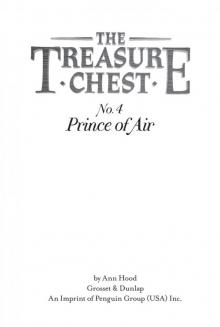 Prince of Air
Prince of Air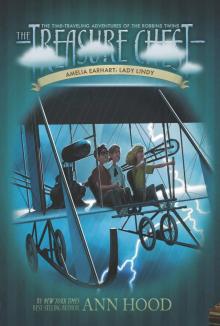 Amelia Earhart: Lady Lindy
Amelia Earhart: Lady Lindy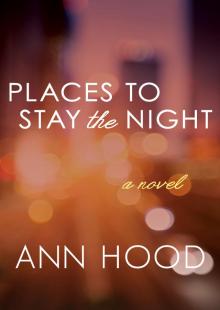 Places to Stay the Night
Places to Stay the Night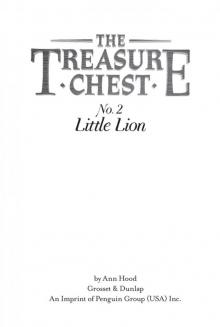 Little Lion
Little Lion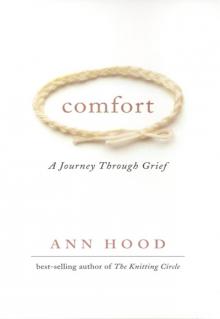 Comfort
Comfort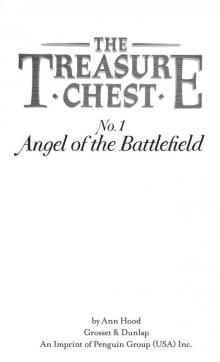 Angel of the Battlefield
Angel of the Battlefield